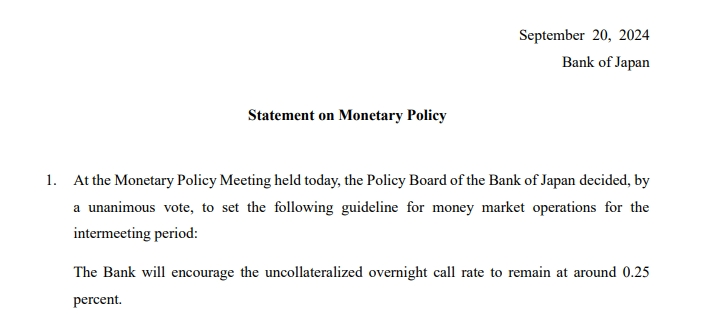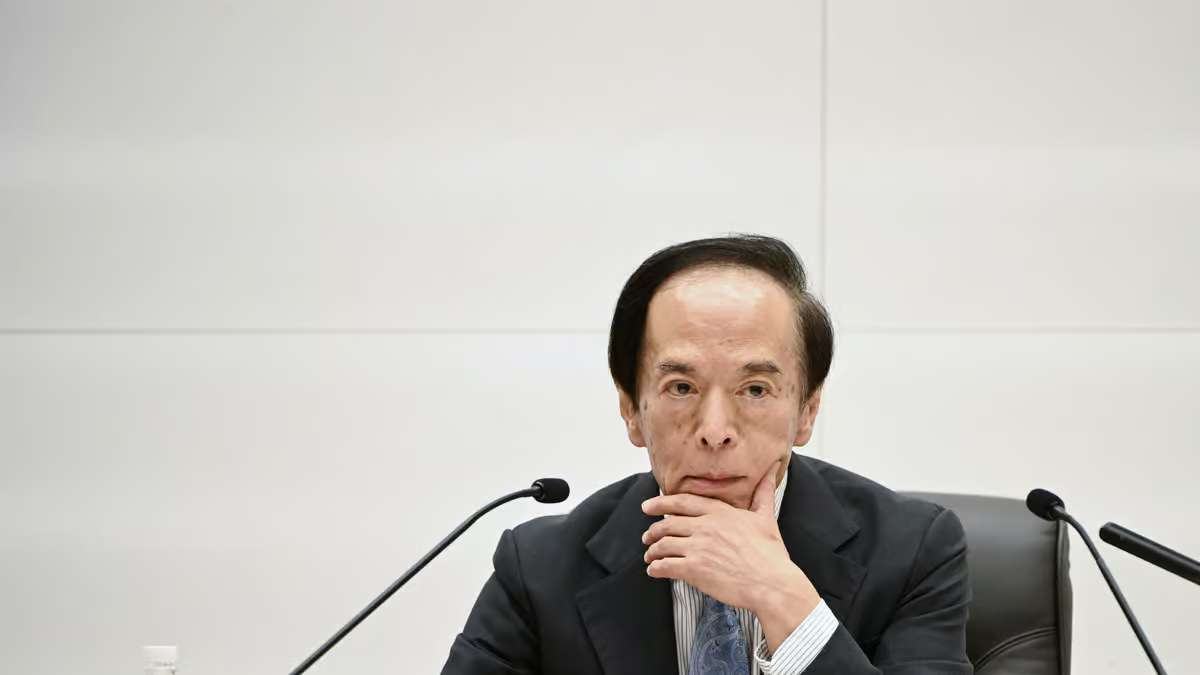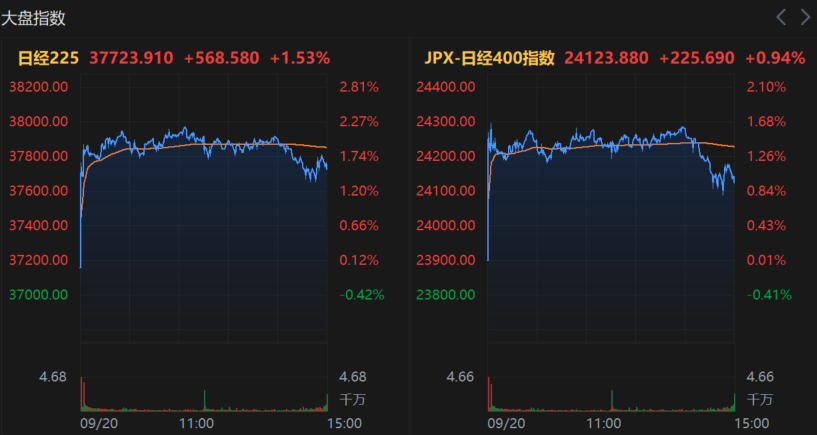The Bank of Japan paused interest rate hikes in September, with the next rate hike possibly in December
If there is no rate hike in December, rate hikes will continue early next year as well.
On September 20th, the Bank of Japan decided at its monetary policy meeting to maintain the current policy interest rate of 0.25% (unsecured overnight lending rate), which aligns with market expectations.

In the subsequent statement, the central bank continued to maintain a cautious stance.
The bank first pointed out some positive changes in the Japanese economy that have occurred recently: rising prices, signs of improvement in private sector consumption, and an increase in employment and income levels; due to increased corporate profits, business investment has also shown an upward trend.
Subsequently, the bank also explained the recent concerns, which is also the reason why the bank does not continue to raise interest rates, including stagnant exports, industrial production, and public investment, and housing investment remains weak.
In terms of prices, the Bank of Japan believes that the rise in service prices has driven the year-on-year increase in the CPI, and the overall CPI excluding fresh food has risen by 2.5% to 3%, which is within the appropriate range. The bank also predicts that Japan's economic growth will remain above the potential level in the future, and the CPI will continue to rise in the fiscal year of 2025.
After the interest rate decision was announced, the foreign exchange market reacted first. The euro/yen cross fell and moved away from the two-week high of 160.00 touched the day before, which is also an important psychological level for the market. The spot price fell to around 158.00 in the last hour, but it is still limited to a wider range than the day before. The US dollar/yen also fell from 142.62 to 142.32.
It is worth mentioning that the European Central Bank just cut interest rates for the second time in the cycle last week, and the Federal Reserve just cut interest rates by 50 basis points more than expected this week.
At the press conference after the interest rate decision, the Governor of the Bank of Japan, Haruhiko Kuroda, said that the Japanese economy is recovering moderately, despite some signs of weakness. Considering that the current real interest rate is still at a very low level, if the economic and price prospects of Japan are realized, the policy interest rate will continue to be raised accordingly, and the degree of policy easing will be adjusted.

Haruhiko Kuroda said, "If economic development is in line with our expectations, our idea of continuing to raise interest rates has not changed."
Haruhiko Kuroda also emphasized that he will monitor economic and market trends with a great sense of urgency. It is necessary to closely monitor the financial market and foreign exchange market, as well as their impact on the Japanese economy and prices. Due to the recent foreign exchange fluctuations, the risk of price increases has been somewhat reduced, so there is still some time in monetary policy decision-making. The risk of inflation exceeding expectations has been reduced to some extent.
He also said that the Bank of Japan currently has no specific timetable to confirm the time required for the impact of the overseas economy on the Bank of Japan's prospects. It is necessary to closely monitor whether the US economy can achieve a soft landing or face more severe adjustments. The Bank of Japan is in a stage of deepening its understanding of the neutral interest rate while paying attention to the impact of interest rate hikes on the economy.
In addition, according to the data released today, Japan's inflation accelerated for the fourth consecutive month in August, with core CPI rising by 2.8% year-on-year, exceeding the central bank's target of 2%, leaving room for further interest rate hikes.
Driven by both policy and data, the Nikkei 225 index soared by 1.53% today, closing at 37,723.91 points; the JPX-Nikkei 400 index rose by 0.94%, closing at 24,123.88 points. The Nikkei index achieved the best single-week performance since mid-August.

The chip sector rebounded sharply (in line with the US chip sector), with the relevant industry index rising by 1.57% this week; the chip manufacturing equipment giant Tokyo Electron's stock price soared by 5.32%, ranking in the top five today. Toyota Motor rose by 0.9%, and Honda Motor rose by 0.84%. The owner of Uniqlo, Fast Retailing, rose by 4.16%. Due to its large weight in the Nikkei index, calculated by weighted points, Fast Retailing has become the biggest support for the rise of the Nikkei index today.
With the announcement of the resolution, the market has turned its attention to the future policy actions of the Bank of Japan. The Bank of Japan ended the negative interest rate policy in March and raised the short-term policy interest rate to 0.25% in July. Subsequently, the recent remarks of several officials of the Bank of Japan have indicated that the Bank of Japan will raise interest rates again before the end of this year.
At present, many analysts say that the next interest rate hike by the Bank of Japan will be in December; if there is no interest rate hike in December, the interest rate hike will continue at the beginning of next year.
·Original
Disclaimer: The views in this article are from the original Creator and do not represent the views or position of Hawk Insight. The content of the article is for reference, communication and learning only, and does not constitute investment advice. If it involves copyright issues, please contact us for deletion.